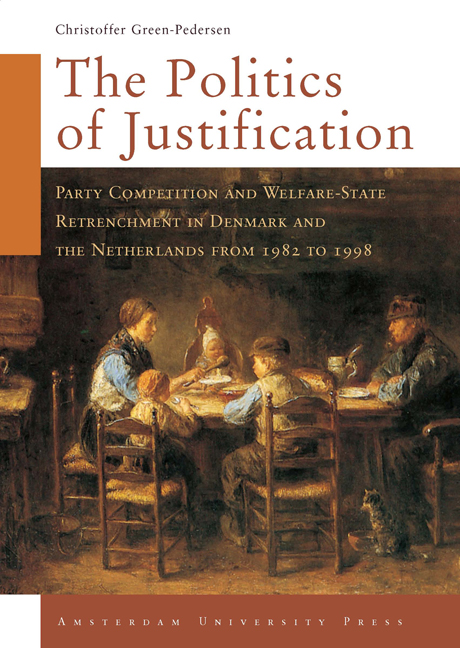 The Politics of Justification
The Politics of Justification Book contents
- Frontmatter
- Acknowledgments
- Contents
- List of Abbreviations
- 1 Introduction
- 2 From Theories of Expansion to Theories of Retrenchment
- 3 Framework for Government Choice on Retrenchment
- 4 Research Strategy and Research Design
- 5 Retrenchments in Denmark and the Netherlands
- 6 Dutch Politics and Welfare-State Retrenchment.How Party Competition Produced Consensus
- 7 Danish Politics and Welfare-State Retrenchment:The Difficulties of a Right-Wing Government and the Possibilities of a Left-Wing Government
- 8 The Evidence on Balance and some Quibbles
- 9 Party Politics Matter – Summary and Implications
- Appendix
- Summary
- Notes
- References
- Index
2 - From Theories of Expansion to Theories of Retrenchment
Published online by Cambridge University Press: 15 January 2021
- Frontmatter
- Acknowledgments
- Contents
- List of Abbreviations
- 1 Introduction
- 2 From Theories of Expansion to Theories of Retrenchment
- 3 Framework for Government Choice on Retrenchment
- 4 Research Strategy and Research Design
- 5 Retrenchments in Denmark and the Netherlands
- 6 Dutch Politics and Welfare-State Retrenchment.How Party Competition Produced Consensus
- 7 Danish Politics and Welfare-State Retrenchment:The Difficulties of a Right-Wing Government and the Possibilities of a Left-Wing Government
- 8 The Evidence on Balance and some Quibbles
- 9 Party Politics Matter – Summary and Implications
- Appendix
- Summary
- Notes
- References
- Index
Summary
Following Pierson's seminal work (1994; 1996), it has become conventional wisdom within the literature on welfare-state retrenchment that retrenchment politics are fundamentally different from expansion politics. This indicates that the scholarly debate about welfare-state retrenchment would be markedly different from the debate about welfare-state expansion, which in several respects is also the case (Green-Pedersen & Haverland 2002). Nevertheless, as will become clear below, the retrenchment debate has not started from scratch. It has been influenced by the preceding and ongoing debate about the growth of the welfare state. Therefore, it is necessary to start with a short introduction to the voluminous literature on welfare-state expansion.
Theories of welfare-state expansion
In the following, a brief sketch of the main positions with regard to the growth of the welfare state will be given.1 This should provide the reader with the necessary background for understanding the retrenchment debate. In general terms, theoretical arguments about the expansion of the welfare state fall into three groups; namely structural or functional theories, theories emphasising the role of politics, especially party politics, and state-centered or institutional theories.
Structural theories all link the emergence of the welfare state to structural changes in society such as modernisation, democratisation, economic growth, or changes in labour market structures (Wilensky 1975; Flora & Alber 1984; Iversen & Cusack 2000, cf. also Pierson 1991: chap. 1 & 2). These societal changes have lead to the emergence of the welfare state. The main aim of these theories has been to explain why all Western countries developed some kind of welfare state. Less attention has been paid to comparative differences. Still, some ‘structural studies’ have focussed on variation among welfare states. By way of example, Cameron (1978) and Katzenstein (1985) emphasize the degree of openness of the economy as a factor leading to different welfare-state developments. Nevertheless, the main impact of the ‘structural theories’ has been to highlight the existence of certain prerequisites for welfare-state development such as democratisation, modernisation etc.
The second group of theories all emphasize the role of politics, especially party politics, in the expansion of the welfare state. With the structural theories, these theories share the ambition of explaining the growth of the welfare state in general.
- Type
- Chapter
- Information
- The Politics of JustificationParty Competition and Welfare-State Retrenchment in Denmark and the Netherlands from 1982 to 1998, pp. 19 - 30Publisher: Amsterdam University PressPrint publication year: 2002
